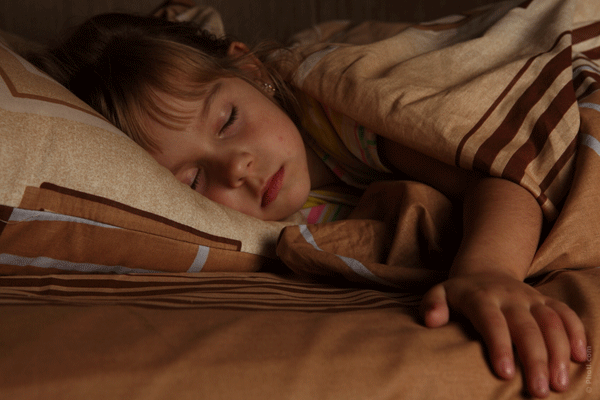Reasons Why Your Kid Cannot Fall Asleep
A schoolchild’s daily sleep duration is 11 to 12 hours, on average. Schoolchildren often get insufficient sleep because of school responsibilities (e.g., homework), additional evening classes and, as a consequence, – going to bed late.

The most common sleep disorders in this age group:
- night fears,
- nightmares,
- sleepwalking,
- teeth grinding (bruxism)
- snoring and noisy breathing.
Signs of behavioral disorders associated with the deterioration of sleep quality in schoolchildren:
- Mood. Lack of sleep can lead to irritability, somberness, and emotional lability. The child may be unreasonably moody and even aggressive, which is associated with the difficulty in controlling emotions. Such children can easily take offense and cry.
- Behavior. Lack of sleep can lead to hyperactivity and rebellious behavior. The child starts to argue and does not obey adults.
- Cognitive disorders (attention, memory, thinking, writing, arithmetic, and language). Insufficient or poor-quality sleep can disrupt attention and short-term memory. There can appear problems with decision-making and reaction, which is very important for the creative process of a school-age child.
How to help your child sleep well?
- Stick to a strict timetable. A schoolchild should go to bed and get up at the same time.
- Try to communicate with your child as much as possible. Time before bed can be used to discuss the day’s events and making plans for the next day.
- Organize favorable conditions for your child’s sleep. Make sure the environment, in which your child falls asleep, is comfortable. A child sleeps best in a cool and dark room, in a peaceful environment. We do not recommend watching frightening TV shows before bedtime. Also, turn off the radio, television and tape-recorder before going to sleep.
- Avoid caffeine-containing products. Caffeine (xanthine) may be contained in coffee, cola, chocolate, tea and so on.
- It is necessary to regulate the natural sleep-wake cycle
- Melatonin is a natural hormone that helps to regulate a schoolchild’s sleep-wake cycle. Melatonin production is largely dependent on the lighting. The brain secretes more melatonin in the evening when it gets dark – and the child falls asleep; during the day, when there’s bright light, brain secretes less melatonin, and a child does not want to sleep. However, many aspects of modern life can disrupt the natural perception of melatonin by the body, as well as the sleep-wake cycle.
A long day in the classroom with natural light, for example, can affect a schoolchild’s daytime wakefulness, and the brain will not want to sleep. Bright light at night, especially in front of a TV or computer screen, can suppress the production of melatonin, so the child won’t fall asleep either. However, there are ways to naturally regulate the sleep-wake cycle, increase melatonin production, and follow a healthy schedule.
Increased light exposure during the day

- Let the schoolchild spend more time outdoors in the daytime. Let him or her play in the street when there is sunlight or do physical exercises outside, walk the dog during the day rather than at night.
- Let as much light into your home as possible. Keep the curtains and blinds open during the day, move the table closer to the window.
- If necessary, use light therapy. Fluorescent lamps can simulate sunlight and will be particularly useful during short winter days when daylight is limited.
Increase the production of melatonin at night
Turn off the TV and the computer before going to bed. Many parents switch on the TV so that the child can fall asleep or relax at the end of the day. But this is a mistake: light suppresses melatonin, and television stimulates our brain. Let your child listen to music or audio books instead of watching TV before bed, or practice relaxation exercises.
Make the child’s bedroom suitable for sleeping
Eliminate noise in the house. If you cannot avoid the noise (dogs barking, neighbors’ loud shouting, city traffic), or other people in your family are making noise, try to mask it with a fan, or let the child listen to the recordings of soothing sounds, such as sounds of the sea. Earplugs in a child’s ears may also help him/her to get rid of unnecessary noise at bedtime.
Keep the room temperature cool. The temperature in a child’s bedroom also affects their sleep. Most people sleep best in a cool room (about 18 °C) with good ventilation. When it is too hot or too cold in the bedroom, it can affect the quality of a child’s sleep.
Make sure the child’s bed is comfortable. The kid must have plenty of room to stretch out and sleep comfortably. If your child often wakes up with pain in the back or neck, you should buy a new mattress or try another pillow. Experiment with different levels of mattress and pillow firmness, which will provide additional comfort to the child.
Do not use the bed for eating or playing games

If the child associates his or her bed with something else apart from sleep – such as games or food, it will be harder to fall asleep. Thus, when the child goes to bed, his or her body gets a powerful impulse: it is time to sleep.
- Relaxing sleep rituals
- Reading a book or magazine with soft light
- A warm bath before bedtime
- Listening to pleasant music
- A few simple relaxation exercises
- Practicing a hobby
- Listening to audiobooks
The child should eat properly and do regular exercise
Healthy nutrition and exercise play an important role in how well a schoolchild sleeps. It is particularly important what the child eats several hours before bedtime.
A schoolchild should not eat at night. Let him/her eat early in the evening, it will help to avoid fatty food consumption within two hours before bedtime. Fatty foods overstrain a schoolchild’s digestive system. Also be careful when it comes to spicy or acidic foods in the evening, because they can cause stomach problems and heartburn.
Do not let your child drink much before bedtime. A large number of liquid reduces the quality of sleep, overfilling the bladder. To avoid this effect, it is better not to drink more than one glass of milk several hours before bedtime.
If a child wants to eat before bed

A snack before going to bed can help some schoolchildren fall asleep. When a child eats fruits or vegetables with carbohydrates, it can help to calm him or her down and fall asleep better. For other children, eating before bedtime can lead to poor digestion and make it difficult to sleep. You have to experiment with your child’s eating habits to determine the optimum dinner menu. If a child needs to have a snack before going to sleep, try the following products:
- A small piece of white meat
- A small plate of whole grain porridge, low in sugar
- A glass of low-fat milk or yogurt
- A banana
A child sleeps more deeply if he or she does sports regularly. It is not necessary to be a sports star to sleep well, just twenty or thirty minutes of everyday sports activities can help to improve sleep. Let the child come out for a walk, ride a bicycle in the street, or work out on a stationary bike.
Some parents prefer exercising with their child in the morning or afternoon; it can stimulate the child’s body and boost his or her energy. Relaxation exercises, such as yoga or stretching can improve the child’s sleep. You can turn on a child yoga video before bedtime (find one on youtube), and try it out together.
Find the best opportunities to sleep
If your child wakes during the night and has problems falling asleep, use the following tips.
- Teach your child to apply visualization. If you find that your child has difficulty falling asleep, teach him or her to use relaxation techniques, visualization, deep breathing, meditation, without even getting out of bed. It is not a substitute for sleep, but it helps to prepare for it.
- Let the child avoid disturbing thoughts and difficult tasks before bedtime. If a child is anxious about something in the evening, ask him or her to postpone it until morning, write down these tasks and put the note on the nightstand. Tomorrow the child will be able to resolve them more productively.
When to see a doctor?

You may start worrying about your schoolchild’s proper sleep and seek medical help, if you notice at least one of the following symptoms.
- Permanent daytime sleepiness or fatigue
- Loud snoring accompanied by pauses in breathing
- Difficulty falling asleep or sleeping
- The child wakes up tired and frustrated in the morning
- Frequent headaches in the morning
- Hand or foot numbness at night
- The inability to move while falling asleep or waking up
- Difficulty falling asleep
All of these tips will help your schoolchild to sleep well, be healthy and energetic.
